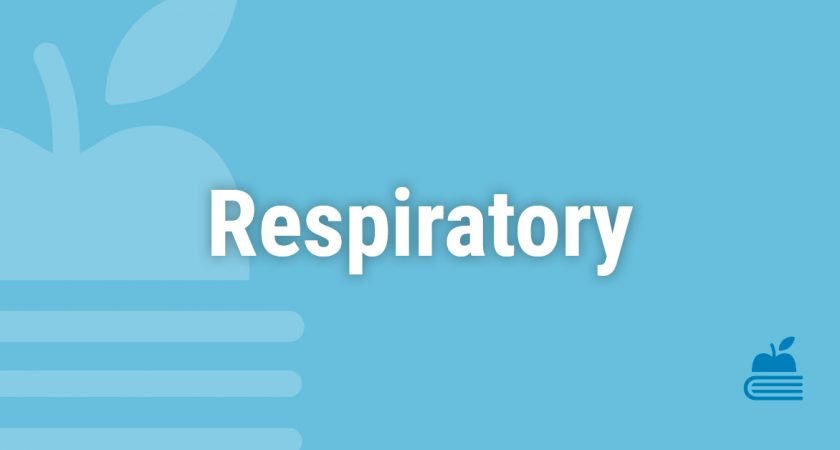Read week
Hi everyone!
You must be very excited to be starting your journey towards freedom!
Can you smell that freedom from exams, institutions and stress? Don’t worry, I understand completely how stressful this journey can be and I won’t pretend that it is easy. In fact, it takes daily courage to wake up and to tell yourself to keep fighting. With family, home, work, exercise and social commitments it certainly is a challenge to find that extra bit of energy to study.
These newsletters are designed to make things a little easier. Each week will help guide you through the content, topics and resources that are useful for your study.
This article is about Respiratory medicine.
In my daily practice, respiratory illness presentations are very common. In January and February it is really common to have school age children presenting for their Asthma Management plan updates to start the school year. When doing these it is a valuable time to update their chronic disease management plans (bill item 721) and organise a spirometry if clinically indicated (bill item 11506). It is vitally important to know how to assess asthma control and to provided education about puffer technique and maintenance. Rounding off each consult about asthma should be a brief reminder to the patient and caregiver about the emergency management plan for an asthma attack (the 4 rule).
The middle of the year is flu season. This is often a time where our clinical intuition is challenged by requests for antibiotics. It is important for all doctors to recognise the difference between a viral and bacterial presentation. This can often be quite difficult. But looking at markers of severity and focus for the condition can be useful, such as isolated symptoms, fever, and tachycardia. The advice I always received when starting out was, don’t be afraid to swab or image if you’re unsure. As your clinical intuition improves, so will your ability to diagnose based on history and examination alone.
Remember, “common things occur commonly” with respiratory illness. The likelihood is that you’ll see asthma, COPD, viral upper respiratory tract infections and sleep apnoea more than anything. Take every opportunity to discuss smoking cessation as soon as you get that first whiff of cigarette smoke – it will prevent significant harm in the future if you can help the patient achieve this. But don’t mention smoking cessation until you’ve built a therapeutic relationship – there’s nothing worse than a “know-it-all” doctor launching right in with this before you even learn who the patient is.
Be kind to yourself, and remember the finish line is not that far away!
Dr Andrew Harris
Director of Amadeus Education.
Did you know?
According to BEACH data, 17.1% of all encounters in General Practice were specifically related to the respiratory system. Consider this as you are preparing for your exams. (Source: General practice activity in Australia: 2015-16. https://bit.ly/2c4d8Em)
Presenting complaints:
These are the common presenting complaints that should be covered for this topic:
- Chest pain, adults (https://bit.ly/2SWPslE)
- Cough (https://bit.ly/2RxhxDq) (BEACH)
- Dyspnoea, acute or chronic (https://bit.ly/2VOqgzs)
- Haemoptysis in adults (https://bit.ly/2VXjTtD)
- Fever that is prolonged (https://bit.ly/2svxLxM)
- Insomnia (BEACH)
- Snoring
Important conditions:
These are the common conditions that should be reviewed for this topic:
Topics | Important reading |
| Asthma (BEACH) |
|
| Spirometry |
|
| COPD (BEACH) |
|
| Smoking cessation |
|
| Interstitial lung disease – including pulmonary fibrosis, sarcoidosis (BEACH) |
|
| Lung cancer |
|
| Pneumonia – including typical/atypical (BEACH) |
|
| Pulmonary embolism (BEACH) |
|
| Bronchiectasis (BEACH) |
|
| Tuberculosis |
|
| Childhood illnesses – Croup, Pertussis, epiglottitis |
|
| Pneumothorax (BEACH) |
|
| Zoonoses – Q Fever/Leptospirosis/brucillosis |
|
| Sleep disorders |
|
| Acute bronchitis |
|
| Pneumothorax |
|
Medication doses:
These are the medications and doses that should be learned for the exam:
Condition | Medication |
| Community acquired pneumonia |
|
| Croup (mild – moderate) |
|
| Pertussis |
|
| Asthma |
|
| COPD |
|
| Smoking cessation |
|
Mnemonics:
These are some important mnemonics relevant to this topic:
- SMARTCOP (pneumonia severity)
- CURB-65 (pneumonia severity)
- Wells’ Criteria (pulmonary embolism)
Checks:
Here are the list of recommended Checks that would be useful in your study for GP exams (accessed via subscription from http://gplearning.racgp.org.au):
- Chronic Conditions, March 2017
- Respiratory Disease, June 2016
Focus on clinical skills:
Here is a brief focus on some OSCE preparation materials related to this topic:
- Inhaler/Spacer technique
- Asthma management plans and dosing
- Smoking cessation counselling – 5As
- Breaking bad news
- Respiratory examination
- Respiratory examination playlist by GP Synergy: https://bit.ly/2CoaKBm
Copyright © 2021 Andrew Harris


I really impressed and appreciate your dedications and work to help us with the exam!
Marvellous.
I am really impressed and appreciate your dedications and work to help us with the exam!
Marvellous.
Welcome to the family! I’m glad you’re enjoying it so far. Feel free to make comments and add any references that you feel will add value to the resource. Check out the Optional Wisdom, Refresh and Nourish articles too!